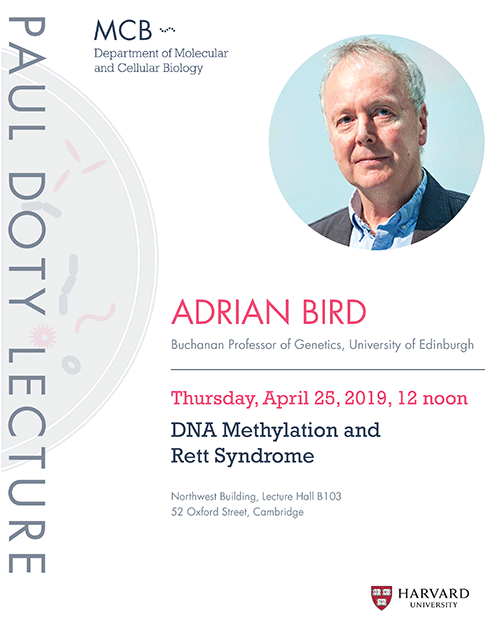Sir Adrian Bird of the University of Edinburgh will deliver the 2019 Paul Doty Lecture April 25 at 12:00 pm in Northwest Building, B103. The topic of the talk will be “DNA Methylation and Rett Syndrome.”
The lecture series is named for founding MCB faculty Paul Doty, who also established the Belfer Center for Science and International Affairs at Harvard. The Doty Lecture speakers are distinguished researchers who further the tradition of excellence in molecular biology.
Sir Adrian Bird has spent decades conducting pioneering research on epigenetics and gene regulation. Originally hailing from England, Bird studied biochemistry at the University of Sussex as an undergraduate and earned his Ph.D. at University of Edinburgh. After a postdoc with noted chromosome researcher Joseph Gall at Yale, he did a second postdoc at University of Zurich, where he began thinking about using DNA-cutting restriction enzymes to map out where methyl molecules bind to DNA.
In 1975, he joined Edwin Southern, who had recently invented the Southern Blot technique, as a research group leader at the MRC Mammalian Genome Unit in the UK. Together, they mapped out methylation patterns in the African clawed frog genome.
Bird is perhaps best known as one of the first researchers to identify DNA regions called “CpG islands,” which are rich in cytosine and guanine. Further investigation revealed that CpG islands often appear in promoter regions and therefore influence which genes are turned on.
In 1990, after a three year stint at the Research Institute for Molecular Pathology in Vienna, he returned to University of Edinburgh as the Buchanan Chair of Genetics. During this time, he helped found the Wellcome Trust Centre for Cell Biology. He would go on to serve as the Centre’s director from 1999 to 2011.
Much of his current research focuses on animal models of Rett Syndrome, a genetic disorder that causes seizures, scoliosis, and autism symptoms. In the early 1990s, his team identified and described a methyl-binding protein called MeCP2. After mutations in the MECP2 genes were identified as the cause of Rett Syndrome, Bird’s team generated the first mouse model of Rett Syndrome, and he has been working on the disorder ever since. In a very influential publication in 2007, his team found that they could reverse the Rett Syndrome-like phenotype in adult mice by expressing a functional copy of MECP2 in the mature animals. The notion that some neurological phenotypes can be reversed in adult animals has since been expanded to other genetic disorders, opening new avenues for therapeutic interventions.
His numerous accolades and honors include election to the Royal Society in 1989, the Gabor Medal of the Royal Society, the Louis-Jeantet Prize for Medicine, the Novartis Medal of the Biochemical Society UK, an honorary doctorate from Sussex University, the Gairdner International Award, the BBVA Frontiers of Knowledge Award, the Shaw Prize in Life Science and Medicine, election as a foreign associate to the National Academy of Sciences, and the Charles Rodolphe Brupbacher Prize, among others.
He was made Commander of the Order of the British Empire in 2005 and knighted in 2014 in recognition of his discoveries and service to science.
Bird serves as a trustee of the Rett Syndrome Research Trust and is a member of the EMBO Council. He remains an influential voice in the field of gene regulation research.
The Harvard MCB community very much looks forward to hearing more about his recent research!
by Diana Crow

Paul Doty was the Mallinckrodt Professor of Biochemistry Emeritus and also Director, Emeritus, of the Belfer Center for Science and International Affairs, which he founded at the John F. Kennedy School of Government in 1974. As a biochemist, Doty elucidated the structure and function of large molecules, ranging from the polymers in plastics and fibers, to polypeptides and polynucleotides. He is perhaps best known for demonstrating the denaturation of the double-stranded DNA molecule and its reuniting through hybridization, a technique that helped open the era of recombinant DNA research. As an advocate for arms control, Doty led and participated in many initiatives to bring Russian and American scientists together in pursuit of international security, making more than 40 trips to the Soviet Union. He was a member of the President’s Science Advisory Committee (PSAC) during the Kennedy Administration. After retirement, he continued his work in this area, including serving as a board member of the Soros International Science Foundation that provided critical research support to Russian scientists in the 1990s. He passed away on December 5, 2011.
Paul Mead Doty (1920-2011) Science Retrospective, PDF


